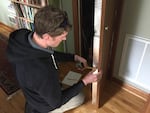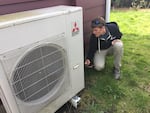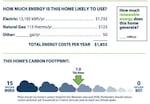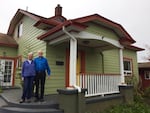
Peter Kernan of Enhabit measures the thickness of the insulation behind a wall as part of the home energy scoring process.
Cassandra Profita/OPB / EarthFix
When I opened my front door to Enhabit Home Energy Score Adviser Peter Kernan, I was actually feeling fairly confident about my home's energy efficiency.
I bought the 1938 Tudor in the dead of winter five years ago and my first electric bill was $250. To heat the home, I had to turn on the original electric wall heaters with their glowing, red-hot coils. The leaky, old single-pane windows failed to keep the snow out of my bedroom.
My first project as a homeowner was to get a home energy assessment and follow most of its recommendations. I spent $20,000 on a super-efficient heat pump system, insulation in the attic and upstairs, new windows and weatherization.
I thought it was a job well done. And I was curious to see how all that work would be tallied in Portland's new mandatory home energy scoring system.

The cost of getting a home energy score ranges from around $150-$250.
Cassandra Profita/OPB / EarthFix
Under the rules that kicked in this year, home energy scores are required for homeowners who want to put their house on the market. The accompanying report tells potential buyers about the home’s energy costs and potential savings. The idea is to nudge people to make their homes more energy efficient and cut the city’s contributions to climate change.
To tally my home energy score, Kernan took measurements of every nook and cranny of the house, prying into the cob-webbed corners of crawl spaces and knee walls and answering my questions along the way.
In the end, he told me, he'd plug all his measurements into a program that cranks out a number from 1 to 10, and that number will be my home energy score.
His first stop was the basement, where it didn't take long for him to spot one of the earlier energy efficiency recommendations I had skipped: wall insulation.
Like An Unzipped Jacket

Peter Kernan of Enhabit measures insulation in the knee wall of the house.
Cassandra Profita/OPB / EarthFix
Our homes contribute about 20 percent of all U.S. carbon emissions and while it isn't necessarily hard to reduce those contributions, it can be a bit pricey.
My initial home energy assessment resulted in a long list of expensive recommendations, one of which was $4,700 worth of wall insulation. The job involved prying some of the cedar planks off the outside of my house to fill the walls with cellulose.
With all the other work I was already paying for, that one didn't make the cut. So, I now have a house with very efficient heating, lots of insulation in the attic and upstairs, and none in the walls and basement.
"It's kind of like wearing a jacket and leaving it unzipped," Kernan said. "You're still losing heat even though you're producing it efficiently."

Peter Kernan of Enhabit checks the efficiency of a heat pump system.
Cassandra Profita/OPB / EarthFix
As we moved through the house I dug up receipts for details on my new windows, heating system and insulation. I moved furniture so Kernan could open up the wall of my closet and look around. Overall, he seemed encouraged by the work that had been done. But it was unclear how it would all factor into the final score.
"Overall, it has a lot going for it," he told me before crunching the numbers. "The insulation job at the top of the house was really good. Heat pumps are pretty efficient, but it's still an old Portland house."
Drum Roll ...
In spite of all the energy efficiency improvements I had paid for, in the end Kernan's home energy scoring program gave my house a 2.
The average score in Portland is a 4. According to the report that came along with my score, my home's carbon footprint is 7 tons per year, and to reach its climate goals, Portland wants me to cut that footprint in half by 2030.

Excerpt from a home energy score report on the carbon footprint of a home.
I was feeling pretty demoralized when I went to talk with Duane Fickeisin and Judy Welles about why they support the new home energy score mandate.
Like me, they did an energy assessment years ago and followed most of the recommendations. They got a new furnace and smart thermostat, added insulation and sealed air leaks.
Then got their home energy score. Their 1921 bungalow got a whopping 8.
Fickeisin said they opted to buy a more expensive and more efficient furnace.
"It probably won't pay for itself," he said, "but we did it because it will reduce the carbon."

Judy Welles and Duane Fickeisin with their very energy efficient home in Southeast Portland.
Cassandra Profita/OPB / EarthFix
Fickeisin and Welles say they're willing to spend more money to reduce their carbon footprint and help save the planet for their grandchildren. They hope the mandatory reports will inspire others to do the same.
“If you know something about what your house is doing, you have the choice of doing something about it," Welles said. "I imagine when our grandchildren are teenagers and they look at us and say why didn’t you do something I’ll be able to look right back at them and say I did everything I possibly could."
A Flawed And Largely Ignored Report?
But most home buyers don’t shop with climate change in mind, according to real estate broker Nick Krautter.
"I would say it probably hasn’t had any effect on the work we do," he said.
Krautter opposes the energy score mandate, as does the entire Portland Association of Metropolitan Realtors. He said the requirement hasn’t caused delays in home sales as he had feared. But most of his buyers don’t even seem to look at the score.
“Other things like price, school districts, proximity to work, those things are all more front-and-center in a buyer’s decision than if it is a 2 or an 8 energy score,” Krautter said.
Real estate broker Mark Wheeler said he's found the measurements and assumptions that go into the scoring process are flawed, and the money for the mandatory report would be better spent on actual home improvements.
"I am all for actual energy efficiency and sustainability actions," he said. "However, this mandatory program will not get us to the city's climate and carbon goals, and it is harming citizens. It is a program of misdirected money, green washing and ineffectiveness."
Update
My initial home energy score report from several years back was only somewhat useful to me, given that the one recommendation it offered wasn't to install wall insulation but to seal the ducting on my new heating system. But Kernan admitted he couldn't tell if those ducts were sealed because they were covered in insulation.
So, my next move was unclear.
Kernan also noted that he might gather more information on my home's energy efficiency from the report that was done in my original home energy assessment, which included testing that wasn't part of the home energy scoring process. Indeed, when he checked that report, he found additional information that boosted my score to a 3.
But my updated report only told me how to get my house to a 4. It didn't tell me how to cut my carbon footprint in half to meet the city's 2030 climate goals. It only recommended one project — sealing ducts — because that was the only project that would pay itself back in 10 years or less.
According to the city of Portland, that feature is built into the U.S. Department of Energy's home energy scoring system, which is the foundation for the city's program.
My report cost $140. That wouldn’t go very far toward the $4,700 cost of putting in wall insulation, but according to Kernan, that project would bump me up to an energy score of 7, and cut my home’s carbon footprint by a quarter.
So, now I have a decision to make: How much am I’m willing to spend and how much carbon pollution do I want to be responsible for?
